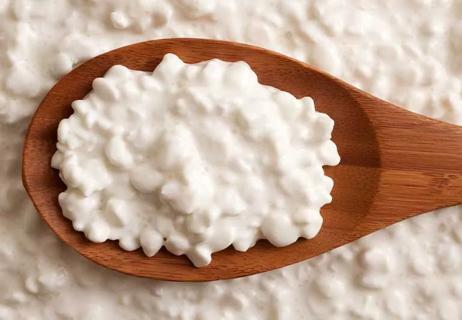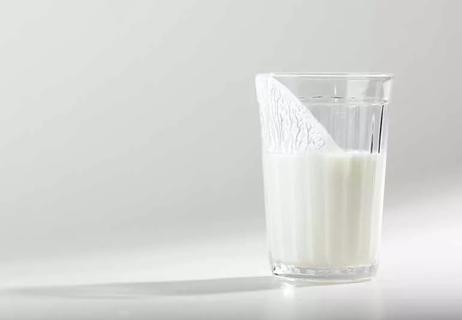Medications, dietary changes, abdominal massage and physical activity can all help you start to feel better

That bowl of ice cream hit the spot! But now ... you feel gassy, bloated and crampy.
Advertisement
Cleveland Clinic is a non-profit academic medical center. Advertising on our site helps support our mission. We do not endorse non-Cleveland Clinic products or services. Policy
If you have lactose intolerance, you know these symptoms all too well. This is because you lack a digestive enzyme called lactase, which breaks down lactose, a natural sugar in milk.
“Most of us are born with this enzyme, but your body makes less of it as you get older,” explains gastroenterologist Claire Jansson-Knodell, MD. That’s why lactose intolerance is more common in adults (though, it affects kids, too).
Lactose intolerance symptoms typically hit within 30 minutes to two hours after you’ve had dairy. But undigested lactose can stay in your digestive system for up to two days, leading symptoms to linger.
When lactose intolerance symptoms strike, these tips from Dr. Jansson-Knodell may provide relief.
Over-the-counter (OTC) medications are often the fastest way to get relief, but the type you need depends on the symptoms you’re experiencing.
Advertisement
You should avoid dairy until your stomach settles. But when you’re having digestive troubles, you may want to avoid these foods and drinks, too:
When your stomach is especially upset, you may want to stick to foods that are easy to digest. Experts sometimes recommend the BRAT diet, which stands for “bananas, rice, applesauce, toast” — all soft, bland foods that are less likely to bother your stomach.
One study found that physical activity may relieve symptoms like gas and bloating. Though the study focused on people with irritable bowel syndrome (IBS), the findings may apply to anyone experiencing digestive problems.
“Movement stimulates the digestive system, helping food and gas pass through faster,” Dr. Jansson-Knodell explains.
These exercises may improve gut health:
Massaging your abdomen can help get things moving, which can relieve gas, bloating and pressure. One study found that abdominal massage improved IBS symptoms, and Dr. Jansson-Knodell says it also could work for lactose intolerance symptoms.
To perform an abdominal massage, follow these steps:
A review of six studies found that ginger eases nausea and vomiting better than a placebo. Peppermint is also known for its stomach-soothing effects. Drink teas made with peppermint or ginger, or try ginger shots.
But skip ginger ale, which doesn’t actually have ginger in it!
Heat relaxes abdominal muscles, which can get things moving in your digestive tract. You can:
Having lactose intolerance doesn’t necessarily mean living a life without dairy. “Most people can enjoy at least some amount of dairy without symptoms,” says Dr. Jansson-Knodell.
You can also minimize your symptoms by having milk with a meal, which slows digestion and reduces how much lactose enters your intestine at once. Another option is to have smaller amounts of dairy (4 ounces or less) throughout the day, which can prevent overwhelming your digestive system with lactose.
Advertisement
These tips can also help:
If you have chronic symptoms of lactose intolerance, talk to a healthcare provider. It could be that another food intolerance or condition, not dairy, is at the root of your issues.
A simple breath test or blood test can rule out or confirm a lactose intolerance diagnosis — and from there, your provider will work with you to figure out next steps.
An elimination diet can help determine which foods or ingredients are actually upsetting your stomach — but this type of diet should only be done under the close guidance of a healthcare provider, like a dietitian.
“Lactose intolerance is fairly common,” Dr. Jansson-Knodell notes, “but many people mistakenly think they have lactose intolerance when something else is to blame.”
Advertisement

Sign up for our Health Essentials emails for expert guidance on nutrition, fitness, sleep, skin care and more.
Learn more about our editorial process.
Advertisement

Health officials say that consuming unpasteurized milk increases potential exposure to harmful bacteria

There’s definite nutritional value in chocolate milk, but the added sugar and calories can be a concern

Experiment with numerous dairy alternatives or try taking a lactase enzyme medication before you eat dairy

Lactose is difficult to breakdown and digest because of its complexity

Be sure to check the labels of common foods like canned tuna, bread, hot dogs and chocolate

This dairy product can help you lose weight, manage blood sugar and strengthen bones

Rich in calcium and protein, milk has 18 of 22 essential nutrients that your body needs

A superfood, kefir is loaded with vitamins, minerals and nutrients

Even small moments of time outdoors can help reduce stress, boost mood and restore a sense of calm

A correct prescription helps your eyes see clearly — but as natural changes occur, you may need stronger or different eyeglasses

Both are medical emergencies, but they are very distinct events with different causes